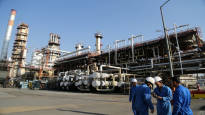Stock markets opened lower and oil prices rose after Israel attacked Iran. At worst, an escalation of the situation could accelerate inflation and raise the price of fuel. So far, market reactions have been moderate.
19.4. 8:42•Updated 19.4. 10:48 am
In Europe, the stock markets opened on Friday to a slight decline after the Israeli missile attack at night.
The Euro Stoxx 600 index, which broadly follows European stocks, was down around 0.58 percent after ten in the morning. The general index of the Helsinki stock exchange was down by about 0.4 percent, and the DAX index of the Frankfurt stock exchange was down by about one percent.
Israel carried out a missile attack on Iranian territory at night. The attack targeted the province of Isfahan, where a strategically important nuclear research facility for Iran is located.
As of Friday morning, there is a lot of uncertainty about how the Israeli strike will affect the price of oil and, more broadly, the world economy.
Nordea’s economist Kristian Nummelin estimate early in the morning that the first reaction is negative. Iran is a major oil producer, and the security situation in the Middle East also affects the transportation of raw materials.
– We can see that the price of oil has risen. However, there is no major jump in the morning rush, Nummelin estimates before eight in the morning.
The price of North Sea Brent oil rose by more than four percent early in the morning and stood at 90 euros per barrel, but fell in the morning hours to around 87 euros per barrel and a 1.5 percent increase.
Nordean Nummelin estimates that Israel’s attack on Iran this morning is some kind of surprise for the market. However, there is no panic to be seen.
Can the impact radiate to Finland and be reflected in fuel prices here?
– If we stay at these prices, there will be no significant impact. Then, of course, if we go much higher than this in the coming weeks and months, it will show.
Last week, oil prices fell after Iran attacked Israel, when the damage was less than feared and there were signs of appeasement in the air. For example, the President of the United States Joe Biden urged Israel to refrain from retaliating.
OP’s senior market economist Jari Hännikäinen evaluates the market effects in messaging service X as “textbook-like”. In X, he shared a calculation of how the conflicts of the past decades have shaken the market: typically the market effects have remained moderate.
The threat of accelerating inflation
Nordean Nummelin says that if the price of energy rises drastically, the effects will be seen elsewhere than just at gas pumps. If the conflict in the Middle East worsens and the price of oil and gas jumps, it would tend to accelerate inflation.
The ECB has kept its key interest rate up for a long time in order to control inflation in the euro area. Now the hope is that the key interest rate will be lowered in the summer – but if inflation were to accelerate due to the rise in energy prices, the interest rate cut could be pushed back into the future. It would affect, for example, Finnish mortgage borrowers whose loans are tied to market interest rates.
If times became very uncertain, it could delay investment and make businesses and consumers tighten their purse strings.
– These will not materialize yet at the current levels, but if this gets clearly worse, this is a scenario that should also be prepared for.
However, Nummelin does not consider such a dark picture as a basic scenario, but as a threat picture. It is also possible that the Israeli strike will not cause a major disruption to the market, if the military situation does not escalate anymore and market nervousness settles down.
– It may also be that we can get through this reasonably well, but there is a lot of uncertainty in the air.
We follow Israel’s attack on Iran in this story.
The story was updated on 19.4. 10:46 a.m.: Updated the latest information on stock market developments and oil prices.
